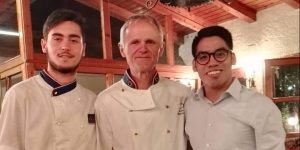The famous phrase "we need saints who wear jeans and drink Coca-Cola," sometimes attributed to Pope Francis or John Paul II on social networks, is in fact apocryphal. Nevertheless, John Paul II, who certainly didn't wear jeans, is the first saint known to drink the fizzy beverage on a regular basis.
With close ties to the Polish diaspora in the United States, where he visited several times as a cardinal, the future pope was a great fan of Coca-Cola, a product that was obviously hard to find in Communist Poland. His biographers tell us that, during the Second Vatican Council, the then young bishop of Krakow regularly went to the refreshment bar during the late-morning break for a Coke.
This preference continued throughout his pontificate. Those who accompanied him on his flights will remember that a discreet Vatican Radio technician, Alberto, was often asked to ensure that he always had a few cans on hand when he traveled.
Coca-Cola and World Youth Day 1993
The high point of John Paul II's relationship with this carbonated beverage can be dated back to World Youth Day in Denver in 1993. The United States was the host country for this international gathering, which served as a logistical test before hosting the Football World Cup the following year, followed by the Olympic Games three years later. In order to make the most of the infrastructure, Brazil took on the same “trilogy” 20 years later.
Less than four years after the fall of the Berlin Wall, the WYD in Denver became a celebration of the victory of capitalism and its symbols. Coca-Cola's name, in white on a red background, appeared massively behind the stage of the celebrations, as did that of cigarette manufacturer Marlboro, in red on a white background. Canadian essayist Naomi Klein sharply criticized this brand presence at a religious gathering in her book No Logo, one of the standard works of the anti-globalization movement.
The omnipresence of Coca-Cola and McDonald's, which supplied the meals, remains a memory for those who took part in the WYD in Denver, according to historian Charles Mercier in his book L'Eglise, les jeunes et la mondialisation - Une histoire des JMJ (Bayard, 2021). The availability of soft drinks and beer at the final gathering site, to the detriment of drinking water, was responsible for thousands of pilgrims suffering from dehydration and food poisoning.
The excessive visibility of sponsors led the organizers of subsequent WYDs, notably in Paris in 1997, to opt for more discreet forms of sponsorship and to provide pilgrims with a more balanced diet.
Benedict XVI, a fan of Fanta mixed with beer
"For Cardinal Ratzinger, it was always Fanta," recalls the owner of a restaurant in Borgo, a district close to the Vatican, where the man who was prefect of the Congregation for the Doctrine of the Faith until 2005 was a regular. The British press presumed to calculate that Benedict XVI drank four cans a day during his pontificate ... that's 1,460 a year!
While this extrapolation may seem excessive, the German pope's taste for Fanta was confirmed by his own secretary, Archbishop Georg Gänswein. In his impactful memoir, Who Believes Is Not Alone: My Life Beside Benedict XVI, he recounts how Benedict XVI liked to drink Fanta, which he sometimes mixed with beer. This strange mix apparently worked rather well for the longest-living pontiff in history, who "never had any digestive problems," says Archbishop Gänswein in his account.

A native of Bavaria, Benedict XVI was also a great lover of beer in its own right, as numerous photos show. For example, at his 90th birthday celebration in April 2017 at Mater Ecclesiae monastery, the Pope Emeritus, seated next to his brother Georg, sips a well-filled tankard.
In his book of interviews with journalist Peter Seewald, Last Testament: In His Own Words, Benedict XVI recalls with nostalgia his experience of the Second Vatican Council and the moments of free time during which he would go for a beer in the Roman district of Trastevere with his fellow theologians.




